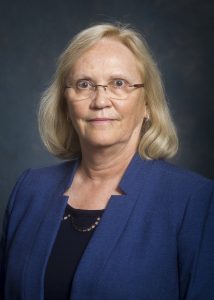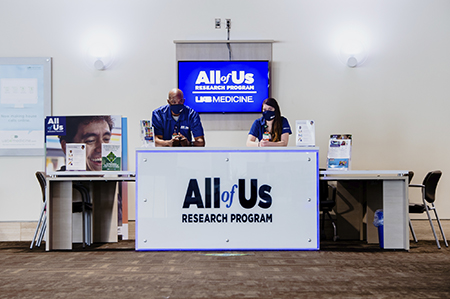Solomon Crenshaw Jr.
The All of Us Research Program was off to a good start in its goal of recruiting one million persons to chart their health and health histories.
“We were really rocking and rolling here in the Southern Network until, of course, March of last year,” said Dr. Cora E. Lewis, a professor and chair of the Department of Epidemiology in the UAB School of Public Health and one of three principal investigators in charge of various aspects of the program at UAB.
“We were enrolling very well,” Lewis continued. “Now we’re going to get started again, and we’re well over 100,000 people already (nationally).”
Julie Schach, the recruitment liaison for the All of Us Southern Network, said that national total is more than 274,000 core participants, for whom required measurements have been done.
“That’s a huge number, so we’re definitely well on our way (toward the goal of one million participants). We did have a lot of steam last year prior to the pandemic and having to go on a pause, understandably. (UAB is) in the Southern Network and we’ve enrolled more than 23,000 in the few years that we’ve been working on All of Us.”
What is the purpose of the All of Us Research Program?

Lewis: The overall goal is to understand more about how some people get sick (and) some people stay healthy. This is a large program that will be studying a lot of things about people’s health, their habits, their genetic backgrounds, and various aspects about their environment. It’s part of this precision medicine initiative that people might have heard about — what’s the right thing (treatment) for you, considering all the aspects of you — your family history, your genetic profile, and that sort of thing. There’s a lot of excitement now about precision medicine. There’s a whole lot going on with precision medicine in cancer. Rather than say, ‘Oh yeah, this is a chest Xray, and it looks like this person has lung cancer,’ you get some of the tissue and find out what’s wrong with those cells. It’s usually a genetic change that makes the cell turn into cancer. Then for that particular kind of cell that has that particular kind of genetic change, one can determine what is the best treatment for it. That’s sort of what precision medicine is about. It’s going to roll out not just in cancer, but lots of other areas of health and disease.
When did in-person enrollment pause for the All of Us Resource Program?
Lewis: March 17, 2020. All of this stuff happened about this time last year that lots of people will remember. A lot of us went home to work.
When did in-person recruitment resume for All of Us at UAB?
Lewis: In January. We’re rolling it out in our different sites at different times. We started recruiting here at UAB in January. We have various places where we’re enrolling here.
Schach: First, we reactivated in-person visits and enrollment

opportunities on January 25 at two of our sites here in Birmingham — Medical Towers, as well as the Kirklin Clinic — and then about a week later, we opened up at our UAB Highlands location. Those are our three sites that are currently open today. We hope to, in the near future, open up at North Pavilion, which was also a very active site prior to our pause. And as Dr. Lewis mentioned, we will open up Cooper Green here, hopefully in the next couple of months or so. We have a reactivation plan we had to submit to NIH (National Institute of Health) specifically for each of the sites and institutions and it’s very rigorous. NIH and UAB take safety very seriously. We’ve been writing lots of plans to make sure that when we integrate back into the clinics, we do it safely, not only for our staff but also, of course, for our participants, and patients and the other staff members that we interact with when we’re on site.
Do you need to make an appointment to enroll?
Lewis: Yes. At this point, those interested can call (833)JOIN-UAB. We also have an email address, allofus@uabmc.edu.
Now that in-person activities have resumed, what policies and procedures have been implemented to ensure the safety of participants in regard to COVID-19?
Lewis: One of the first things that we did was we became very intimately familiar with those maps that show the number of COVID cases and that sort of thing. Things had to be going in the right direction (in the number of cases). We were looking very closely at the local conditions. We had to have a plan for how we could do this with social distancing, limiting capacity. We can’t cram a whole bunch of people into a small space, frequently cleaning, everybody wearing a mask. Those (are the) kinds of things that we’re doing now that people never thought about before.
Are there alternative ways to enroll in the program if one does not feel comfortable with in-person activities at this time?
Lewis: Yes. It’s just like anything else. Some people are at higher risk; some people are more concerned. We have the ability to do this by phone. We also have a video chat. We have a secure system set up where we can help people enroll, and do all of the things up to the point where you would actually have to touch somebody. We could get that data later. For instance, we take blood pressures, but that requires that you get kind of close to people. We can get everything done but those last few things, and we can do those at a later date.
If I am already a member of the All of Us Research Program, is there more I can do?
Lewis: Oh, sure. This is meant to be what’s called a cohort study, where we’re not just seeing people once. We’re following them over time to see what happens to them. Periodically, we put out some new health surveys that we ask people to complete. We’ve been doing a series of surveys called COPE, which are about how people are coping with COVID. This is affecting everybody. It’s a study of health, so we’re studying that too. If you’ve already joined the program, great. We’re really happy to have you. We want to keep you engaged.
Why is it important/impactful to participate in the All of Us Research Program?
Lewis: The whole idea behind this is that we want to find out the best ways to keep people healthy. What should people with certain characteristics do? Should they be getting more exercise than, say, other kinds of people who can get away with exercising less? It’s very much looking at medical conditions, health habits, and putting all of this together into that precision medicine thing for people, individually. Not the average person but you as an individual.
What are some of the benefits to a participant after joining the program?
Lewis: We’ve been working on that. One of the things that we’ve been committed to doing is, when we do an analysis of somebody’s blood or DNA, we’re going to be returning those results to people who want those results. We are doing that now with some of the genetic testing that we’ve been doing. People talk about signing up for 23 and Me and getting ancestry information. Well, we’re returning that now to people as we are working through doing the genotyping.




